Why eating plants "beets" eating animals!
Plus links and other veggie resources!

I created this page because I'm frequently asked about being vegetarian/vegan, (there is a growing interest and awareness afoot!)
and because it's a lifestyle we find so rewarding and beneficial in myriad ways, it's gratifying to share it.
I hope you find this page informative, helpful, entertaining...and ultimately, persuasive! ;-)
Since first creating this "vegetarian" page, we became vegan in Aug 2000. Being vegan is a lifestyle (including but not limited to diet) based on Ahimsa, a Sanskrit term meaning noninjuring, nonharming. A vegan diet is entirely plant-based, containing no animal products (meat, dairy, eggs, honey). Following the principles of Ahimsa involves more than just food choices (for instance, vegans also avoid using items made from critters, such as fur or leather, products containing animal ingredients, or products that are tested on animals...and Ahimsa applies to refraining from harming or exploiting fellow humans and the planet, as well). But for the sake of simplicity and because it's the aspect of veganism most generally asked about, discussed, understood (or misunderstood!), and initially embraced, I'll stick to food issues here. And in case you're unsure, "vegan" is pronounced VEE-gn, and "veg*n," a term I'll use frequently, is an abbreviation for "vegetarian and/or vegan."
Unfortunately, we weren't always veg*n. But there's so much we learned (and continue to learn) that inspired us to make profound changes in our habits and in our thinking, and it's been (and continues to be) such a wonderful experience in every way, and that is what I want and hope to share with this page. It's not that I want to convert everyone to vegetarianism... Oh, wait. YES I do!! Heheheh....
Oh, don't worry... read on! The life you save may be your own.
Or this little guy's ~~
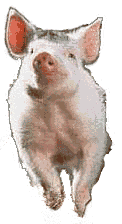
Our first dietary change came about shortly after I was diagnosed with MS, and I learned about the MS Diet.
In a nutshell (haha), the MS Diet eliminates most animal fat from the diet. So we adopted it, learned how to cook without using cow, pig and sheep, and with only fat-free dairy products. We still ate fish and skinless white chicken and turkey though, and would jokingly tell people we were "vergetarian"...on the verge of being vegetarian. ;-)

So I threw out some recipes, modified others, and one day I was telling my neighbor Vistara about my new diet.
Vistara, a vegetarian for many years, offered to teach me how to cook a meal using tofu. ("Yuk!" I thought.)
But it was delicious! Next thing I knew, I was buying a tofu cookbook! (Tofu's easy to use, ya just gotta know how!)
As time went on, we met more people who truly were vegetarian (not vergetarians!), and we read some books,
and the more we read and listened and thought, the more reasons we found to eliminate animal products from our diet altogether.
In fact, we could come up with no reason to keep eating them, and a lot of reasons not to. So here's a synopsis of the reasons
we no longer "dine on corpses!"~~

"Animals are my friends...
and I don't eat my friends."
~George Bernard Shaw
George summed that up pretty well! Unless this is the first of my pages you've visited, you probably already know how I feel about animals! I've never seen them as "lesser beings," but rather "fellow beings" who also feel pain and fear and would rather live than die. So how could I in good conscience contribute to their suffering and death by eating them? I couldn't, so I no longer do. (As a third grader I attempted to become vegetarian, after the appalling experience of touring a "pork processing plant" on a field trip. But alas my rebellion, though vigorously and most righteously conducted, was adamantly quashed by food pyramid-abiding parental authorities. Took a while, but I finally grew up, and was later "reminded" by Fate of the principles of my youth!) Most people prefer not to know how animals on factory farms live, or how they die. But ignorance is not bliss in this case, and doesn't eliminate the unspeakable cruelty and suffering. If touring a factory farm or slaughterhouse doesn't appeal, you can always try taking a look at this page from the Factory Farming web site.
Most dairy and eggs are produced through factory farming, and are also slaughter industries.
To learn about the ramifications of dairy products, visit "But It Doesn't Hurt The Cow"
To learn about eggs, visit "The Rotten Egg Industry"
For a vegan answer to the "free range" issue, click here.
"You have just dined, and however scrupulously
the slaughterhouse is concealed
in the graceful distance of miles,
there is complicity."
- Ralph Waldo Emerson




"The poor man's grain is being siphoned
to feed the rich man's cow."
~ a United Nations director
Meat-eating is also detrimental to the welfare of people and the planet, since it contributes significantly to famine and pollution,
and is a huge waste of resources. There are many statistics and entire books that support this point,
but here are just a few facts that may surprise you:
~ 80-90% of all grain grown in the US goes to feed animals intended for food. That same amount of grain could feed one billion humans!
Yet while we fatten "meat animals" so we can kill and eat them, 60 million people around the world starve to death every year.~ One acre used to raise a steer will provide only about one pound of protein,
but the same acre, planted with soybeans, will provide 17 pounds of protein!
~ According to a recent Cornell University study (published in the October 2004 issue of the journal BioScience),
it takes 43,000 liters (approximately 11,360 gallons) of water to produce a kilogram of beef,
but only 1,600 liters (423 gallons) to produce a kilo of rice and just 650 liters (171 gallons) to produce that amount of corn.

"The earth has enough for everyone's need,
but not enough for everyone's greed."
~Mahatma GandhiIf we adopt a plant-based diet, we can feed the world's hungry people. And we conserve water, soil, fossil fuels and reduce pollution. We protect wildlife, their habitats, and biodiversity. And we help save the rainforests, which are being cut to graze beef cattle...which may mean cheap burgers at fast food joints, but results in the permanent loss of approximately six plant and animal species every hour....
that's about 100 species...gone forever...every day!!

Click for free daily to help save rainforest!
"The Rainforest Site"
"Care2's Race For The Rainforest"

"When we kill animals to eat them,
they end up killing us because their flesh,
which contains cholesterol and saturated fat,
was never intended for human beings,
who are natural herbivores."
- Willam C. Roberts, MD
Editor-in-Chief, American Journal of Cardiology
A big reason people become vegetarian or vegan is concern about their own health. Voluminous studies in country after country
have shown that a vegetarian diet is far healthier than a meat-eating one. According to the American Dietetic Association (to cite one),
a low-fat, meatless diet reduces the risk of heart disease, several types of cancer, high blood pressure, diabetes mellitus,
osteoporosis, kidney stones, gallstones and diverticular disease. A vegetarian diet has also been shown to help prevent strokes
and macular degeneration. The human body was designed for a plant-based diet, and evidence shows that deviating from that diet
is a major factor in developing chronic, degenerative diseases, which have reached epidemic proportions in carnivorous countries.
And here is some food for thought: it takes about 5 days for animal flesh to pass through the human digestive system
(compared to about 1 1/2 days for plant foods) and before then, it has putrefied.
UGH! Bon appetit!
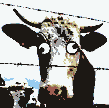
If weight is a concern, it's easy to get slim and stay slim on a lowfat, vegetarian diet, without ever feeling deprived.
One out of three Americans is overweight or obese (which can greatly increase the chance of developing many of the diseases
listed above), while on average, vegetarians weigh 20 pounds less than meat eaters.

"But for the sake of some little mouthful of flesh,
we deprive a soul of the sun and light,
and of that proportion of life and time
they had been born to enjoy."
~ Plutarch, "Moralia"
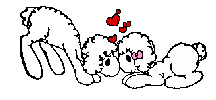
About as often as I'm asked why I am vegan, I'm also asked if we ever miss meat, eggs or dairy, and the answer is no.
Veg*n cuisine is rich and delicious, and far from being a "diet of deprivation," we now enjoy far more variety in our meals
than we did when they were animal-based. It's also balanced and nutritious (that "variety" is key!). It's a myth that a plant-based diet
doesn't provide enough protein, vitamins or minerals! In fact, the Standard American Diet ("SAD") provides far too much protein, which is a source of several serious health problems, and plant foods are invariably a superior source of nutrients (afterall, it's where the animals get their nutrients that then end up in their flesh, eggs and milk...it's far more efficient for us to eliminate the "middle man!") While we eat and recommend a mostly whole-foods, plant based diet that's organic whenever possible, free of genetic modification and hydrogenated fats,
and containing minimally processed foods, there are many substitutes for meat, dairy and egg products that make transitioning much easier, and you'll probably keep some of them in your permanent repertoire.
Instead of animal milk, try the wide variety of almond, rice, oat and soy milks in various flavors, "lite," and unsweetened. Don't expect them to taste like cow's milk (though you'll find some of the lite, unsweetened soy milk varieties come pretty close), since they have their own unique textures and flavors. Some are so sweet and rich they're like dessert drinks, while others are more neutral in taste and thinner like skim milk (good for washing down dark chocolate!) Most people end up preferring the taste of "plant milk" over cow's milk (along with the absence of hormones, antibiotics, pus (from mastitis), pesticides, and side effects of lactose intolerance, congestion and sinus problems), so try several - you're sure to find at least one favorite! You can find or make non-dairy ice cream (we make ours with cashews), sour cream, and yogurt. You can substitute nutritional yeast flakes or avocado for cheese, try foods without cheese (we actually prefer cheeseless pizza now, as the flavors of the toppings and sauce really come through), or try one of the TRULY vegan cheeses available, without CASEIN (a milk protein).
There are several ways to replace eggs in a recipe, including commercial egg replacer, tofu, mashed banana, or (my favorite):
combine 1 TBSP ground flaxseed with 2-3 TBSP water, mix well and let stand a couple of minutes until gelatinous.
There are too many "meat analogs" to list, including plant-based substitutes for bacon, deli meats, ground beef, hot dogs, hamburgers, sausage, shredded barbecue, turkey, jerky... Do be sure to check the labels! Not all are vegan, some are overly processed and may contain genetically modified ingredients. You can also substitute meat in a recipe with organic tofu, a complete protein, loaded with isoflavones and very versatile. Tofu and tempeh ("TEM-pay"), a highly nutritious fermented soy product from Indonesia, have several health benefits and can really enhance a veggie diet. If you're allergic to soy but can eat wheat, there's also seitan ("SAY-tan"), an excellent meat substitute made from wheat gluten. Beans, lentils and grains like barley can replace meat in many recipes.
Let's support organic farming!

If you're considering adopting a vegetarian or vegan diet, significantly reducing your consumption of animal products, or want to explore in greater depth the issues I've merely touched on here, I encourage you to visit the links I've provided (a drop in the bucket of what's available online!), or read any or all of the books I've listed. While in retrospect I advocate giving up animal products (ahem)...cold turkey, because it's actually simpler and you'll lose your taste and cravings for them far more quickly and easily than if you continue to keep any amount in your diet, most people (including us!) do make the transition in steps. If this is how you choose to go about it, there are several options. Give up animal products for one month (but do a little homework first) and see how it goes. Or introduce some veg*n meals into your routine several times a week. Or eliminate one animal product at a time as you discover a whole new world of delicious foods to take its place. Your library, your local healthfood store, and of course the Internet are wonderful resources for recipes, tips, support and information. And I invite you to email me if you have questions, would like some simple recipes to get you started, or if you'd like advice about specific food brands.
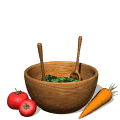
When it comes to changing our diet, it's chiefly a matter of changing our minds. Knowledge is power, and there are many industries with a huge vested interest in keeping people confused, habituated, and in the dark. Keep an open mind and learn all you can from impeccable, credible sources whose agenda is a better, kinder, healthier world, not the entrenched status quo or a larger profit margin. Have a sense of adventure about trying new foods, and the courage of your convictions when pressured by often well-meaning but misinformed people. Seek out support from the MANY sources available. See with fresh eyes euphemisms like "meat" (flesh), "seafood" (sea life), and the other sanitized words we use to distance ourself from the animals we eat (beef, pork, poultry, livestock, game, etc). Changing the habits of a lifetime can be intimidating for many reasons, so have a sense of fun and adventure, be patient with yourself (Ahimsa applies to you, too!), and remember how powerful this change is! See it for what it truly is - a nourishing diet of health, compassion, and tremendous abundance and variety, not deprivation. Our food choices have so many wide-ranging, far-reaching consequences, both personal and global, it's empowering and inspiring to learn what a profoundly positive impact you make by choosing organic, plant-based foods.
I thank you for visiting this page...the animals thank you...and the planet thanks you!
Now ~ eat your veggies! ;-)
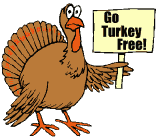

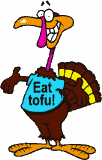
Please visit

for a very eloquent argument for a plant-based diet!

Click and take EarthSave's Veg Pledge for 60 days! You decide just how "veg" you want to go, and they send you informational, inspirational material to get you started and provide support. It's fun, it's free and it's earth, people and animal friendly!



Why Be Vegan and How to Start The title says it all! This page alone is a great source of information, with several articles and links, but it's just one part of a larger web site devoted mainly to vegan nutrition and cuisine. The site belongs to Bryanna Clark Grogan, a vegan chef and one of our favorite cookbook authors.
VegSource The biggest veg web site on the internet.
TryVeg.com From Compassion Over Killing, this comprehensive site answers every "why" and "how" of veganism and vegetarianism, and also offers free veg*n recipes and a free veg starter kit.
Vegan Outreach Another wonderful site with lots of helpful info.
In A Vegetarian Kitchen So many wonderful vegan recipes, so little time!
This site is the creation of longtime veg*n chef Nava Atlas, and it's a treasure.
The Vegan Chef Another great collection of recipes and info from another wonderful vegan chef, Beverly Lynn Burnett.
We love her Blueberry Corncakes!
"Famous Vegetarians" This one may hold some surprises for you!
10 Reasons to Eat More Like a Vegetarian A concise description of the health benefits of a predominantly plant-based diet.
International Vegetarian Union A wealth of goodies here, available in several languages ~ news, international recipes,
links to worldwide vegetarian societies, vegetarian history, a worldwide calendar of events & lots more!
FARM (Farm Animal Reform Movement) Co-sponsors of The Great American Meatout, held in communities across America
on the first day of Spring (March 20). A great opportunity to try vegetarian dishes, exchange recipes, and learn more about
being vegetarian! Find out where it's being held in your area!
Vegan Essentials It isn't just about not eating animal products...it's about not wearing them, too! This site is one of many that offer quality alternatives to leather and wool, as well as other cruelty-free products.




(Most of these were also the sources of information for this page, not to mention sources of personal inspiration! They cover far more eloquently and thoroughly the topics I merely touched on here, and then some! I highly recommend them all.)
MAD COWBOY by Howard Lyman (Scribner/Simon & Schuster)... This 4th generation Montana cattle rancher became a vegan activist, and tells you why in his inimitable style in this superb behind-the-scenes look at the meat industry. You can also visit Howard's web site, Mad Cowboy.
WHAT'S WRONG WITH EATING MEAT? by Vistara Parham (Sisters Universal Publishing)... A small, inexpensive book that explores the physiological, health, ecological, political, economic and moral reasons for not eating meat.
THE FOOD REVOLUTION by John Robbins (Conari Press)...
The heir to the Baskin-Robbins ice cream company walked away from the family business and the Standard American Diet. He reveals how your dietary choices affect your health, the welfare of animals, and the future of life on our planet. Reading this gentle yet comprehensive, eyes-wide-open book (a follow-up to "Diet for a New America") will help you make informed choices! And it may very well change (and save) your life! It has for many.
(Howard, Vistara and John were our teachers, guides and main inspiration, and I dedicate this page to them! Thanks, guys!)
THE CHINA STUDY by T. Colin Campbell, PhD and Thomas M. Campbell II (Benbella Books)... Focusing exclusively on health issues, Dr. Campbell explains findings from the ongoing China Study - begun in the early 1970's - the most comprehensive large study on the relationship between diet and disease ever undertaken. Dr. Campbell's credentials as a nutritional scholar are as numerous as they are impressive, and in addition to discussing health and nutrition, he also explains as an insider the insidious ties between the food and healthcare industries, government, and education. As a result of his research, Dr. Campbell, who grew up on a dairy farm and ate a typical American diet, became vegan and a highly respected advocate of a whole foods, plant-based diet. An eye-opening, fascinating book!
Howard Lyman, John Robbins and Colin Campbell give talks and lectures around the country.
If you EVER get a chance to hear any of them speak, do NOT miss it!
THE MCDOUGALL PROGRAM by John A. McDougall, M.D. (Plume Book/Penguin Books)... Dr. McDougall is one of several MDs (Barnard, Ornish, Greger, Klaper, etc) authoring books and articles advocating a low-fat, plant-based diet. In addition to helpful nutritional and medical advice and recipes to help you lose weight permanently and/or regain and retain optimum health, Dr. McDougall shares his interesting experience as a young stroke victim, medical student, inquisitive medical doctor who challenged the status quo, and finally passionate proponent of a vegan diet. He's also got a web site and free newsletter, both featuring recipes.
BECOMING VEGAN by Brenda Davis R.D. & Vesanto Melina, M.S., R.D. (Book Publishing Company)... An invaluable tool for everyone, vegan or not! Loaded with excellent information on nutrition, it's my most-used reference book.
THE VEGAN SOURCEBOOK by Joanne Stepaniak, M.S.ED. (Lowell House)... As the title suggests, this book is a virtual encyclopedia of veganism. Wonderfully comprehensive, immensely helpful (it includes nutrition guidelines, recipes, menus and substitutions) and written by a very compassionate author (her discussion of compassion is, in fact, one of my favorite sections), this is a valuable resource for everyone, and particularly for new or transitioning vegans.
Excellent veg*n cookbooks are increasingly plentiful (we have over two dozen superb vegan cookbooks - too many to list here!) as are online vegan recipes and tips for "veganizing" existing recipes. Feel free to email me for recommendations!

A Prayer for Animals
Hear our humble prayer, O God, for our friends the animals,
especially for animals who are suffering;
for any that are hunted or lost or deserted or frightened or hungry;
for all that must be put to death.
We entreat for them all Thy mercy and pity, and for those who deal with them
we ask a heart of compassion and gentle hands and kindly words.
Make us, ourselves, to be true friends to animals and so to share the blessings of the merciful.
~ Albert Schweitzer
Thanks for being visitor number
(The advertising accompanying the page counter is beyond the webmistress' control and she may or may not be a fan of the advertisers!)
It was soy nice of you to come! ;-)
"Talk to the Animals"

from "Dr. Doolittle"
(The Dog House) (Paws for a Cause) (The Fox Den) (Foxfire) (Faeries) (Scotland) (Scotland Photos) (My Photos)
(Pet Photos) (Wyoming Photos) (Wildlife Photos) (Bird Photos) (Hummingbird Photos) (Wild Things)
(Favorite Quotes) (Courage) (When You Wish Upon A Star) (Who Are You?)
(Awards) (Awards II) (Awards III) (Sign "Pawprints" Book) (View "Pawprints" Book)
(Sign "Dogbone" Book) (View "Dogbone" Book)